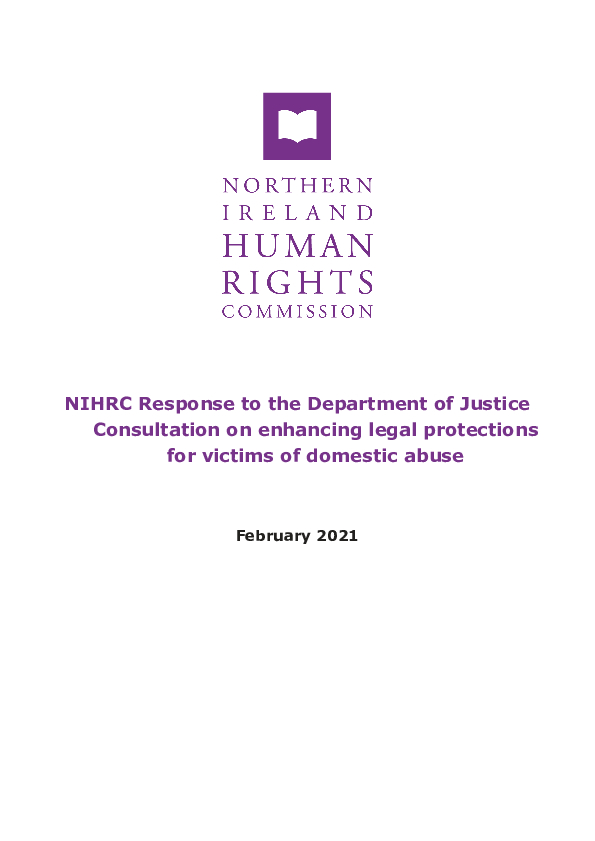NIHRC Response to the Department of Justice Consultation on enhancing legal protections for victims of domestic abuse
Last Updated: Monday, 19 April 2021
Read the NI Human Rights Commission response to the Department of Justice consultation on enhancing legal protections for victims of domestic abuse.
Date produced February 2021.
Below is a summary of the recommendations contained in the report.
You can also download the full document through the links provided.
- 4.10 The NIHRC recommends the introduction of Domestic Abuse Protection Orders and Notices to provide immediate protection to victims of all forms of domestic abuse and that these are accessible across the criminal justice system.
- 4.11 The NIHRC recommends that Legal Aid is available for applying for a Domestic Abuse Protection Order.
- 4.12 The NIHRC recommends that the relevant authorities, particularly the police, should be adequately trained to ensure Domestic Abuse Protection Orders and Notices are effectively implemented.
- 4.13 The NIHRC recommends additional resources are allocated to the police and potential relevant third parties specifically for training and application fees for Domestic Violence Protection Orders and Notices.
- 4.14 The NIHRC recommends the Department reconsider such a lengthy and limited piloting exercise, to ensure the Domestic Abuse Protection Orders and Notices can be accessed by all victims of domestic abuse without further delay.
- 4.19 The NIHRC recommends the Department provide further clarification on which individuals and organisations should be identified as potential relevant third parties. This should include engaging with organizations supporting victims and victims on implementation issues.
- 4.20 The NIHRC recommends the Department consider potential consequences of third party application negating the victim’s consent recognising the dynamics of domestic abuse and ensure it does not hinder the victim in subsequent legal proceedings.
- 4.21 The NIHRC recommends that if the regulations are to specify the role of relevant third party organisations in applying for Domestic Abuse Protection Orders, that these organisations are provided with specialised training and adequate funding to fulfil this role.
- 4.26 The NIHRC recommends that any interference with Article 8 ECHR is a measure of last resort and must be in accordance with the law. The NIHRC recommends the Department produce appropriate guidance on the use of Domestic Abuse Protection Notices to ensure compliance with Article 8 ECHR.
- 5.8 The NIHRC recommends the Department provides further clarification on the statutory safeguards that would be used if electronic monitoring is implemented and that these reference human rights standards, in particular consideration of Article 8 ECHR.
- 5.9 The NIHRC recommends that the Department pilots the introduction of electronic monitoring, nonetheless, it should that it does not delay the introduction of Domestic Abuse Protection Orders and Notices.
- 5.14 The NIHRC recommends clear guidance is provided to the Police Service NI on what constitutes a breach of a Domestic Abuse Protection Order and Notice to ensure perpetrators receive appropriate sanctions.
- 6.3 The NIHRC recommends that the Department works with the relevant public authorities and civil society organisations to systematically collect and publish data on domestic abuse that is disaggregated by sex, gender, ethnicity, disability and age. It should also record the journey of abuse investigations through the criminal justice system, including number of initial reports, number of referrals to the Public Prosecution Service, how many reach different stages of the court process, how many prosecutions, what is the resulting remedy and how many repeat offences.

Download Documents
Your browser is out-of-date!
Update your browser to view this website correctly. Update my browser now